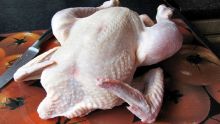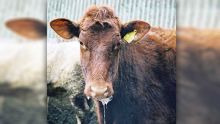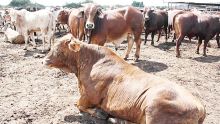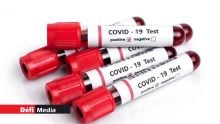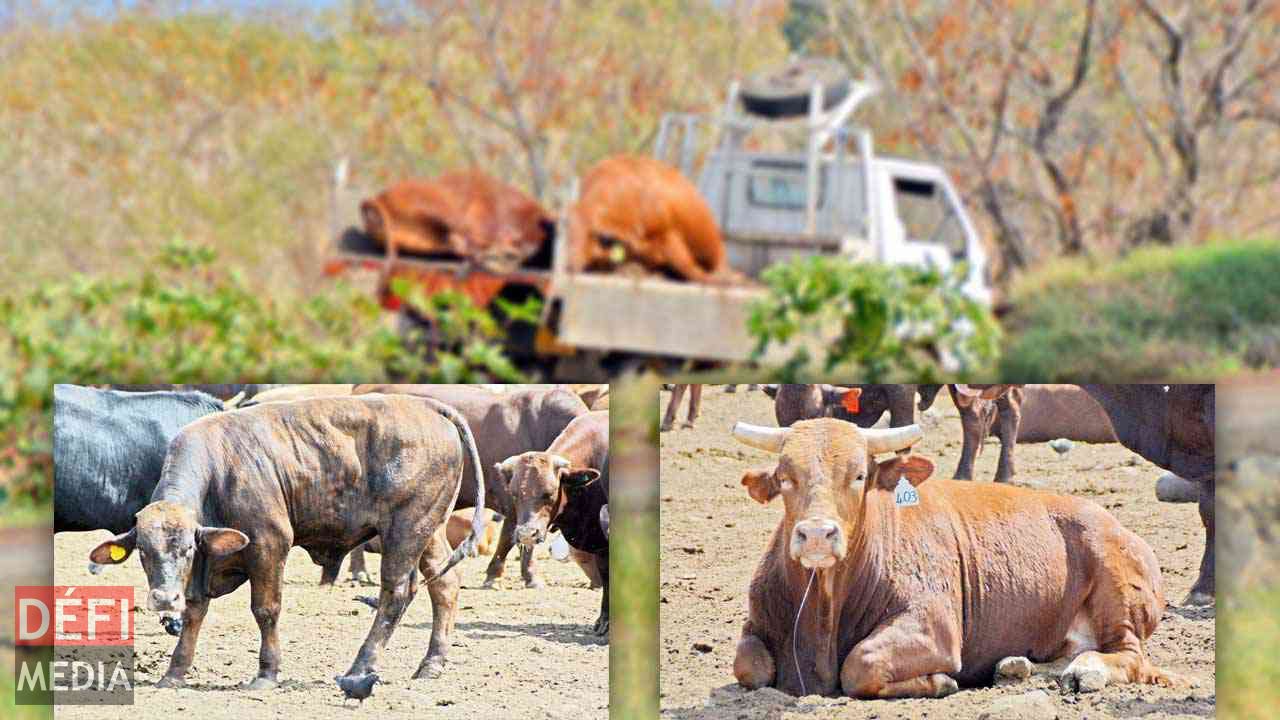
After almost one month since the outbreak of the foot and mouth disease, the situation in Mauritius has worsened and the country is being kept in hostage of the epidemic. For weeks, mainly small breeders were affected but the great surprise came when one of the biggest farms of Mauritius, Socovia became a prey of this disease. One question on the lips of each and every individual is how this situation could have been prevented.
Publicité
Small breeders and large farms face losses
Breeding is not an easy job and need lots of investment. Small farmers have suffered severe losses in just one month. Many of them have lost above Rs 400,000. Abdullah Yassine has invested more than Rs 400,000 and had to return Rs 50,000 to Rs 60,000 to his clients. “There is a huge cost associated with breeding. You buy the animal when it is still young. You have to feed it. You have to pay the shipping cost for transportation.” Sanjeet Rughoobeer has lost around Rs 2 million. Socovia firm had to refund Rs 45 million to over 2,000 customers. “Initially, we are concentrating on refunding clients. It is our priority,” the director Hussein Pirbaccosse said a brief statement. Accordingly, the firm has incurred major losses. The cost of transportation itself can cost around Rs 30 to 40 million.
 Are humans at risk?
Are humans at risk?
According to the European Centre for Disease Prevention and Control, the risk of Foot and Mouth disease being transmitted to humans visiting affected areas is extremely low, if consumption of unpasteurised milk, dairy products or unprocessed meat from infected animals and direct contact with such animals is avoided. Foot and Mouth disease in humans is considered very rare. During the large outbreak of FMD affecting animals in the United Kingdom in 2007, no human cases were reported despite enhanced surveillance for human cases.
Dr Swaley Abdoola: “The Mauritian authorities have wasted too much time”
A former Senior Veterinary Officer of the Ministry of Agro Industry, Dr Swaley Abdoola, is adamant that such a situation could have been prevented. “We are in a serious situation which is getting worse and complicated by each passing hour. One of the worst decisions taken was allowing animals from Rodrigues to enter the Mauritian territory. In Rodrigues, the veterinary officers were unsure about the disease. The officers should have carried the test again if they were unsure. Even if the animals had arrived in the country, they should not have reached the quay. But even if the animals reached the port, we should have disinfected all passengers. The veterinary department knows it is absolutely necessary to disinfect the dock. Another mistake is transporting the animals to Richelieu quarantine centre.”
For him, the Mauritian authorities have wasted too much time in trying to figure out what should have been done and meanwhile, the damages were already done. “The veterinary service of the Ministry of Agro Industry has not taken decisions quickly enough. When the first case was detected in Vallée Des Pretres, authorities again took time to react. The breeders at Vallée de Pretres had warned the authorities about symptoms but they were attended to after 12 hours, which were more than enough for the virus to spread over the farm and infect other animals. Similarly, the wrong vaccination was imported and time was wasted again. The ministry has been committing mistake after mistake.”
Referring to the recent case of Sovocia, he believes that the government should have prevented the firm Socovia from importing animals. “The farm is already infected by nearly 70% and if necessary precautions are not taken, the whole farm can be infected. Even if the animals have been imported from South Africa and vaccinated, the risk was still present. The officers should be aware that there are various types of virus associated with the disease and not all vaccinations are effective.”
Dr Swaleh Abdoola also states that there has been a lack of expertise and coordination. “Since the outbreak, we can notice chaos going on. There was lack of information and communication. This can be seen from the fact that officers at Rodrigues allow a full load of infected animals to come to Mauritius. Now it is up to the Fact Finding Committee to investigate what was lacking and under whose responsibility all this chaos took place.”
 Dr Deodass Meenowa: “All the precautionary measures have been taken”
Dr Deodass Meenowa: “All the precautionary measures have been taken”
The Assistant Director, Livestock and Veterinary Division of the Ministry of Agro-Industry, Dr Deodass Meenowa, explains that at the Ministry level, they have taken all the precautionary measures. “We are sure and certain that till now, all measures taken conform to the bio security protocol. We have a fixed guideline that we follow when there is importation of animals. Once the animals are at the port, a team of veterinary officers check the animals before they are put in quarantine. This is a normal procedure that we have been following for years. Hence, we did not forecast such an epidemic in Mauritius and Rodrigues.”
Dr Meenowa further adds that “we cannot just close the barrier between Mauritius and Rodrigues, as we form part of the same territory. Animals keep on moving from these two countries. There was free access between the two countries. There is a misconception that one cargo is a major cause of the outbreak in Mauritius. The normal routine was carried out when the cargo reached Mauritius. The veterinary officer checked the health papers and inspected the animals. Everything was normal. As per the rules and measures, they were sent to the quarantine centre. The premises were disinfected. So all precautionary measures were taken on that day.”
However, as highlighted by the veterinary, animals got infected but still the ministry continued to strive hard to prevent propagation. “Vaccination has been done in a parameter of 15 km where the infection was detected. Strict movement of animals and transport were observed. All persons in contact with the animals had to disinfect their shoes before getting in contact with other animals. The same rule applied for transportation vehicles. Communiqués were sent out to sensitise the public. So, the ministry tried its very best to prevent the spread of the disease further.”
Commenting on the case of Socovia, he says that bio security must be primordial and there must have been some errors in this case. “The situation will be back to normal in around one year or so depending on the cases. The first vaccination has been done. After 21 days, a second one will be done, after four months, a third dosage. Both active and passive supervision is needed. The blood of animals will be sent for analysis. We have to wait for around one year or so for bio security purposes.” Dr Meenowa reveals that in the near future, they will be even more cautious. “We will come up with a restructuring plan for better supervision and protection.”
Mauritius and Rodrigues have lost millions of rupees and hundreds of animals in such a short time. Foot and mouth disease is a highly infectious disease and can contaminate easily. Socovia imported 2,780 animals from South Africa and 70% of them have been infected. It was Rodrigues which got infected at first, followed by Mauritius. According to the Ministry of Agro-industry, it will take three years for the virus to be eliminated. However, many people still question whether this situation could have been averted.
Considerable economic impact
The Foot and Mouth Disease outbreak affecting livestock in Mauritius and Rodrigues comes at a time when recent budgetary measures have boosted confidence in this sector. This epidemic will have a considerable impact on livestock, but also on the economy as a whole. In just two months, the country has lost millions of rupees. The government alone had to inject Rs 17.6 million in compensating the 32 small farmers in Mauritius and 15.3 million for Rodrigues farmers. The government has also had to spend on vaccine doses imported from Botswana. All these have a high cost. The government needs to invest more to monitor the situation. With the epidemic gaining momentum, people are afraid to eat meat and drink cow milk. In this context, demand for meat has declined and sale has also decreased. It is expected to decrease further in the coming days. Similarly, there is a decline in the production of milk. Some breeders claim that milk yield has dropped by 50% following vaccination of their heifers.

Notre service WhatsApp. Vous êtes témoins d`un événement d`actualité ou d`une scène insolite? Envoyez-nous vos photos ou vidéos sur le 5 259 82 00 !














